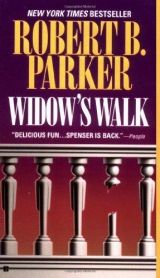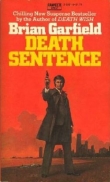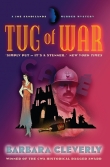
Текст книги "Widow’s Walk"
Автор книги: Robert B. Parker
Жанр:
Крутой детектив
сообщить о нарушении
Текущая страница: 5 (всего у книги 13 страниц)
CHAPTER TWENTY-ONE
I was sitting in the guidance office at Franklin High School, talking with a sturdy gray-haired woman named Ethel Graffino.
“Mary Toricelli,” she said. “Name doesn’t ring a bell. A lot of students passed through here in thirty-five years.”
“Class of 1989,” I said. “Used to date a boy named Roy Levesque.”
“Him I remember,” Mrs. Graffino said. “He was in here a lot.”
“Why?”
“Bad kid. Stole. Peddled dope. Cheated. Bullied any kids he could. I believe he dropped out without graduating.”
“We all cheated,” I said.
Mrs. Graffino smiled. “I know, but we’re still required to condemn it.”
“How about friends.”
“Roy’s? Or Mary’s?”
“Either.”
“I can give you class lists,” she said.
“Two years on either side?”
“‘Eighty-seven through ’ninety-one? Are you going to harass these people?”
“No. I’m just going to ask them pleasantly about Mary and Roy.”
“And you’re trying to clear Mary of a murder charge?”
“Yes.”
“And you are working for a law firm?”
“Yes. Cone Oakes.”
“Is there someone I could call?”
“Sure.” I gave her Rita Fiore’s number.
She said, “Excuse me,” called it and talked with Rita and hung up.
“I needed to be sure,” she said.
She got up and went around to her office door and spoke to the secretary. Then she came back and sat.
“It’ll only be a minute,” she said. “Computers, you know, they’ve revolutionized record-keeping.”
“I’m going to get one soon,” I said.
“They’re here to stay,” she said.
Her phone rang. She excused herself again and answered. While she talked I thought how schools always felt like schools when you went in them. Even full grown and far removed, when I went in one I felt the old hostility again. While Mrs. Graffino spoke on the phone, the secretary came in with several pages of printout and put them on Mrs. Graffino’s desk. She mouthed “thank you” to the secretary, pushed the printouts toward me, and nodded. I picked them up. Another list. About 1,200 names long. We never sleep.
CHAPTER TWENTY-TWO
I sat with Susan and Pearl on the front steps of her big Victorian house in Cambridge, where she had her office on the first floor and her home on the second. I drank some beer. Susan had a martini I’d made for her, which she would sip for maybe two hours and leave half finished. Pearl was abstaining. People went by and smiled at us. Occasionally someone would walk a dog past, and Pearl would give a disinterested bark. Otherwise we were quiet.
“I should be wearing a sleeveless undershirt,” I said.
“The notorious wife-beater undershirt,” Susan said.
“Like Brando,” I said. “In Streetcar.”
“Wasn’t he a wonderful actor?” Susan said.
“No,” I said. “I always thought he seemed mannered and self-aware.”
“Really?”
“Can’t help it,” I said.
“But he was so beautiful.”
“Didn’t do much for me,” I said.
A woman with shoulder-length gray hair walked by in hiking boots and short shorts. Her companion was tall and bald with a combover.
“How you feeling?” I said to Susan.
“Like I failed.”
“The kid who killed himself?”
“Yes. I’m supposed to prevent those things.”
“Didn’t someone say something about the tyrannical ”supposed to’s“?”
“Karen Horney,” Susan said. “The tyrannical shoulds.”
A guy walked past wearing a seersucker suit and one of those long-billed boating caps. He had a tan mongrel on a leash. The mongrel was wearing a red kerchief.
“Stylish,” I said.
Susan nodded. Pearl lay between us on the top step with her head on her paws. The mongrel spotted Pearl and barked at her. Pearl’s hearing wasn’t much anymore. She glanced at the source of what must have been a dim sound, and growled a little without raising her head. Susan patted her absently.
“My office was the only place he was safe,” Susan said. “His parents were appalled that he was gay. His schoolmates were cruel. He had no friends.”
I didn’t say anything.
“He could only be who he was in my office.”
I nodded.
“I couldn’t help him to change who he was. I couldn’t help him to accept who he was. All I could accomplish, finally, for a few hours a week, was to provide a temporary refuge.”
“Not enough,” I said.
“No.”
My beer was gone. I got up and went to the kitchen and got a jar of olives and another beer. I was trying Heineken again. A blast from the past. Susan was having another micro sip of her martini when I came back and sat down beside her. It was still warm, in the evening. The air had begun to turn faintly blue as the darkness came toward us. There was no wind. I plunked a fresh olive into Susan’s martini. She smiled at me.
“If they have something somewhere,” Susan said. “If they are loved at home. If they have a circle of friends. But if it’s no good at home and it’s no good at school… Goddamn it.”
“No place to hide,” I said.
“No place.”
“Any theories why people are such jerks about it?” I said.
Susan shrugged.
“Nature of the beast,” she said.
“There is a high jerk count among the general populace,” I said. “Present company, of course, excluded.”
Four girls from Radcliffe went past us in various stages of undress. They all talked in that fast, slightly nasal way that well-bred young women talked around here.
“Living in a college town is not a bad thing,” I said.
Susan watched silently as the girls passed. She sipped her martini. I could hear her breathing.
“We are both in a business,” I said, “where we lose people.”
“I know.”
“A wise therapist once told me that you can’t really protect anyone, that sooner or later they have to protect themselves.”
“Did I say that?”
“Yes.”
“After you lost Candy Sloan?”
“Yes.”
“I am wise.”
“Good-looking, too,” I said.
“But god-damn it…” she said.
“Doesn’t mean you can’t feel bad when you lose one.”
Susan nodded.
“Go ahead,” I said. “Feel bad.”
Susan nodded again.
“I’ve been fighting it,” she said.
“And losing,” I said.
“Yes.”
“Give in to it. Feel as bad as you have to feel. Then get over it.”
Susan stared at me for a while. Then she put her head against my shoulder. We sat for a time watching the street traffic. I listened to her breathing.
“That what you do?”
“Yes.”
“Even after Candy Sloan?”
“Yes.”
She fished another olive from the jar and put it in her martini. She had already drunk nearly a fifth of it.
“And,” I said, “there’s always you and me.”
“I know.”
A squirrel ran along Susan’s front fence and up a fat oak tree and disappeared into the thick foliage. Pearl followed it with her eyes but didn’t raise her head.
“You’re a good therapist,” Susan said after a while.
“Yes, I am,” I said. “Maybe we should open a joint practice.”
With her head still against my shoulder Susan patted my thigh.
“Maybe not,” Susan said.
CHAPTER TWENTY-THREE
It took me three days to boil the class lists down to people I could locate, and another two days to find people on that list who remembered Mary Toricelli. One of them was a woman named Jamie Deluca, who tended bar at a place on Friend Street, near the Fleet Center.
I went in to see her at 3:15 in the afternoon when the lunch crowd had left and the early cocktail group had not yet arrived. Jamie drew me a draft beer and placed it on a napkin in front of me.
“I didn’t really know her very good,” Jamie said. “Mary was really kind of a phantom.”
Jamie had short blond hair and a lot of eye makeup. She was wearing black pants and a white shirt with the cuffs turned back.
“What kind of a phantom?” I said.
“Well, you know. You didn’t see much of her. She wasn’t popular or anything. She just come to class and go home.”
“Sisters or brothers?”
“I don’t think so.”
While she talked Jamie sliced the skin off whole lemons. I wondered if the object was to harvest the skin, or the skinless lemon. I decided that asking would be a needless distraction, and I had the sense that Jamie would find too much distraction daunting.
“Parents?”
“Sure, of course.” Jamie looked as if it was the dumbest question she’d ever heard. “She lived with her mother.”
“Father?”
“I don’t know. When I knew her there wasn’t no father around.”
“Her mother still live in Franklin?” I said.
“I don’t know.”
“Her mother’s name is Toricelli.”
“Sure. I guess so.”
“Who’d Mary hang out with?” I said.
“Most of the time she didn’t hang with anybody,” Jamie said. “She didn’t have a bunch of friends. Just some of the burnouts.”
“Burnouts?”
“Yeah. You know, druggies, dropouts, the dregs.”
“Remember anybody?”
“Yeah. Roy Levesque. He was like her boyfriend. And, ah, Tammy, and Pike, and Joey Bucci… I don’t know some of those kids. I think she just hung with them because she didn’t have no other friends.”
“Got any last names for Tammy and Pike?”
“Pike is a last name. It’s a guy. I don’t even remember his first name. Everybody called him Pike.”
“How about Tammy?”
“Wagner, I think. Tammy Wagner. Kids used to call her Wags.”
“You know where they are?”
“No. I moved in with my boyfriend soon as I graduated. Pretty much lost touch with the kids I knew.”
“Boyfriend from Franklin?”
“No. Brockton. I met him at a club. He didn’t last.”
“Sorry to hear that.”
“It’s all right, he was a loser anyway.”
“Lot of them around,” I said, just to be saying something.
“Least he didn’t knock me up,” she said.
I nodded as I was glad about that, too.
“What was Mary like,” I said. “Was she smart in school?”
“No. She was pretty dumb. Kids made fun of her. Teachers, too, sometimes.”
“She ever get in trouble?”
Jamie shook her head and smiled.
“She was too boring to get in trouble,” Jamie said.
The early cocktail crowd was beginning to drift in. The demands on Jamie made it harder to talk with her.
“Anything else you can tell me about Mary?” I said. “Anything unusual?”
Down the bar a guy was gesturing to Jamie. He had on a black shirt with the collar worn out over the lapels of his pearl gray suit.
“No,” Jamie said as she started to move down the bar. “She was just a kind of dumb phantom kid, you know? Nothing special.”
That would be Mary.
CHAPTER TWENTY-FOUR
I was in my office reading Tank Mcationamara and preparing to think about Mary Toricelli Smith some more when my door opened carefully and a woman poked her head in.
“Mr. Spenser?”
“Yes, ma’am.”
She came in quickly and shut the door behind her.
“Remember me?” she said. “Amy Peters? From Pequod Bank?”
“Who could forget you,” I said.
I gestured quite elegantly, I thought, at one of my two client chairs. She sat and crossed her legs, holding her purse in her lap with both hands. I smiled. She smiled. I waited.
“I… I… don’t know quite how to do this,” she said.
“I can tell.”
“It’s… I’ve been fired.”
“I’m sorry,” I said.
“It was… they said I had no business talking to you the way I did.”
“What would be the business of a PR director?” I said.
She smiled and shrugged. “I don’t even know what I said to you that was so bad,” she said.
“Who exactly is ”they“?”
“Mr. Conroy. He called me into his office and questioned me quite closely about our conversation.”
“And?”
“And when he was through he told me I was fired. The bank, he said, would give me two weeks’ pay. But as of this moment I was through.”
“What was the thrust of his questioning?” I said.
“He wanted to know what we talked about.”
“Specifically,” I said.
“He wanted to know what you asked about Mr. Smith, and what I told you.”
“And why are you telling me?”
She stopped as if she hadn’t thought about that before. I nodded encouragingly.
“I, well, I guess I thought it was important,” she said.
“Un huh?”
“I mean, you are investigating his death.”
“Do you have a theory about what the connection might be?” I said.
“They seemed pretty worried about you.”
“”They“ being Marvin Conroy?”
“Yes.”
“Why do you call him ”they“?”
“I don’t know. I guess…” She paused and thought about my question. “I guess it’s because I think there are people behind him.”
“How so?”
“I think he has allegiances outside the bank,” she said.
“Why do you think that?”
She was sitting very straight in her chair, sitting with her knees together, leaning forward from the waist. The position hiked her short skirt to mid thigh. I admired her legs.
“Well, he came in as a partner all of a sudden,” she said. “This was a family-owned bank for more than a hundred years and all of a sudden here comes this man who’s not a member of the family, and not, um, not of the social class you’d expect. And he wasn’t in the bank much. When he was, he was… I don’t know how to explain it. It’s just an impression. But he was like some kind of court-appointed monitor, you know, like he was overseeing something.”
“What social class is Conroy?”
“I don’t mean he’s what my mother would have called low class. But Mr. Smith was always so civilized and charming and gentle. He’d never fire anybody. He always made sure people were taken care of if they were sick or on maternity leave or anything. If there was an employee problem, he would call them into his office and talk it through with them.”
“Conroy was a little less civilized?”
“He wasn’t a dese, dem, dose kind of man. He was obviously educated. But he was very…” She searched for a phrase. “He was a bottom-line person. Very hard-nosed, no nonsense.”
“Do you have an address for Conroy?” I said.
“Just the bank,” she said.
“Okay. I’ll go see him there.”
“You won’t tell him I spoke to you?”
“Not if you don’t want me to.”
“He’s so…” She fluttered her hand. “He’s so cold. He seems like someone who doesn’t care about people.”
“Does he frighten you?”
“Yes.”
“It’ll be our secret,” I said.
She sat back, her body still straight, her knees still together. Both her feet were firmly on the floor, and she tugged the hem of her skirt slightly forward toward her knees. It was an automatic grooming gesture, like fluffing her hair. She probably didn’t know she was doing it.
I smiled at her.
She looked at me.
“That’s the other reason I came to tell you about this,” she said.
“Which is?”
“That he frightens me.”
I nodded.
“You seemed like someone to talk to if I’m frightened,” she said.
I didn’t have anything to say about that, so I smiled encouragingly.
“You seem like someone who would protect me,” she said.
“Do you think you need protection?” I said.
“No, not really. I think I’m probably being a bit of a sissy.”
“Anyone threaten you?”
“Oh, no, nothing like that. Conroy said I wasn’t to talk of this matter, but he meant if I wanted a letter of reference for my next job.”
I gave her my card. On the back of it, I wrote Hawk’s name and cell phone number.
“If you feel threatened, call me, at any hour. If you don’t reach me, call the number on the back. It’s a large black man with his head shaved who could protect Australia if he were asked.”
“Will he know who I am?”
“Yes.”
“It’s silly, of course. But I feel better knowing there’s someone I can call.”
“Anyone would,” I said.
CHAPTER TWENTY-FIVE
“Do you think she’s in any real danger?” Susan said.
“Probably not,” I said. “She’s a bright young woman. Went to school, got an MBA, and this is the first time she’s been fired.”
“So her ego requires her to invest it with cosmic proportion.”
“Once she’s been fired a few times, she’ll get used to it,” I said.
“The voice of experience?”
“Something like that,” I said.
I was cooking supper and Susan was pitching in by sitting at my kitchen counter drinking white wine and watching.
“Are you sure you’re cooking those scallops long enough?” she said.
“Of what can we be sure,” I said, “in this uncertain world?”
“We’re not going to discuss the nature of being, are we?” Susan said.
“No.”
“Thank God.”
“Or whoever,” I said.
“Stop that,” Susan said.
She sipped her wine. I tossed the scallops in the saute pan one more time and slid them onto a plate.
“They don’t look cooked to me,” she said.
“Suze,” I said, “when you make tea, you burn the water.”
“Do I hear you saying shut the fuck up?”
“At least about cooking,” I said.
“Mum’s the word.”
I also dente’d the pasta and found it correct and poured it through a colander. I added some green peas and the sauteed scallops and tossed it all with some pesto sauce and put it on the counter. We ate at the counter, sitting side by side. Susan broke off a tiny piece from a loaf of French bread and ate it with a minimalist forkful of the pasta.
“You’re right,” she said. “You don’t need my help.”
“Not to cook,” I said.
“Or much of anything else,” she said.
I glanced at her sideways. “What about, you know?” I said.
“I don’t consider that help,” she said.
“Well, you are certainly not a hindrance,” I said.
“Sometimes I think it’s the only thing I’m good at.”
I drank some beer. “Well, if there could only be one thing…” I said.
She didn’t say anything. I could feel us drifting into a more serious corner of the evening.
“I can’t get that kid out of my head,” Susan said.
“The suicide?”
“Yes.”
“Would you expect to, this soon after?”
“No,” she said, “I suppose I wouldn’t.”
“In time,” I said, “the sharp edges round off.”
“I hope so.”
“Seems a shame,” I said, “that so harmless a variation should cause such pain.”
“I know,” Susan said. “People, especially young people, often think the circles they are in are the only circles that matter. They don’t realize that there is a world where nobody much gives a goddamn.”
Susan finished her wine. I poured her some more. She gestured me to stop at half a glass.
“It’s not the condition,” she said, “or whatever. It’s the concealment.”
“Like Watergate,” I said. “It wasn’t the burglary that caused all the trouble; it was the cover-up.”
“Something like that,” Susan said. “Pretending to be what you are not fills people with self-loathing. If they share their secret, even with a sex partner, then others have power over them. They are vulnerable to blackmail of one kind or another.”
I carefully twirled some pasta onto my fork. Susan could eat with chopsticks, but she was nowhere at twirling pasta.
“You know,” I said, “prior to Mary Smith, I cannot find any sign of a sex partner for Nathan Smith.”
“How old was he when he got married?”
“Fifty-one,” I said.
“Children?” Susan said. “With Mary?”
“No. But she told me that he was friendly with a number of young boys.”
“Maybe you’re looking for the wrong kind of sex partner,” Susan said.
CHAPTER TWENTY-SIX
There was a photographer I knew named Race Witherspoon who was gayer than springtime and quite happy about it. He had his studios this year in a fourth-floor loft in South Boston, just across Fort Point Channel.
His studio was cluttered with tripods, and reflector umbrellas, and props, and Diet Coke cans. Curled Polaroid peel-offs were everywhere. A Flintlock musket leaned in a corner. A red feather boa was draped over the edge of an old rolltop desk. A cowboy hat lay on top of a file cabinet, a pair of combat boots stood side by side on an overturned milk carton. Light flooded in through a skylight. On the wall was a huge black-and-white blowup of two naked men. I tried to remain calm about it.
In the middle of the clutter Race was surgically immaculate. His white flannel pants were sharply creased. His turquoise shirt was fitted. His black-and-white shoes were gleaming.
“Oh my God!” Race said. “Man of my dreams.”
“How unfortunate,” I said.
“Well, honey,” he said, “sooner or later they all come back.”
“I need homo info,” I said.
Race grinned and did a small shuffle ball change and spread his arms.
“You’ve come to the right place, Big Boy.”
“If you were an older man,” I said.
“Which I’m not,” Race said.
“Certainly not,” I said. “In all the years I’ve known you you haven’t aged any more than I have.”
“That’s unkind,” Race said. “But go ahead, if I were an older man…”
“Where would you be likely to go to meet young men?”
“How young.”
“Boys.”
“Nellie’s,” Race said. “Third floor. It’s chickenfucker central.”
“Joint in Bay Village?” I said.
“Nice turn of phrase, honey,” Race said.
“I try to be appropriate,” I said. “Bay Village?”
“Where else?”
“Ever go there?”
“Downstairs,” he said. “I don’t like children much.”
I took the picture of Nathan Smith out and held it up for him. “Ever see this guy?”
Race examined the picture. “Not my type,” he said.
“You know him?”
“No.”
“If I took this picture down to Nellie’s and showed it around, you think they’d tell me anything?”
“Nellie’s doesn’t stay in business by telling secrets,” Race said.
“How about I pretended I was in your program?” I said. I shot out my right hip and put my fist on it.
Race said, “They could tell.”
“How could they tell?”
“They could tell, honey.”
“I’m not even sure this guy was gay,” I said.
“And you’re trying to decide?”
“I’m not trying to out him. He’s been murdered.”
Race nodded. “I’ll tell you what, darlin‘. You give me the picture. I’ll find out for you.”
I gave him the picture.
“Isn’t there some saying about set a queer to catch a queer?” Race said.
“I think so,” I said.








